Saturday Summaries 2018-07-21: Decennial Anniversary Edition
By Mento 0 Comments
From the daily series of reminders of just how old we all are comes the news that Giant Bomb turned ten years old this week, if you consider a very specific definition of what Giant Bomb is. There's a lot of nostalgia wrapped up in those ten years, and Rorie and the editorial team have done a fine job curating the highlights in the site's anniversary round-up here.
I've been trying to think of a way I could honor its ten years that didn't invariably involve talking about myself and/or my presence on Giant Bomb throughout the last decade. I've decided that it's functionally impossible for me not to talk about myself, however, so I'm splitting the distance by talking about ten video games - one released each year of the site's existence - that I may not have found or appreciated without the site's help and involvement. In some cases, they're games I was always going to like but that affection was elevated further by Giant Bomb's involvement.
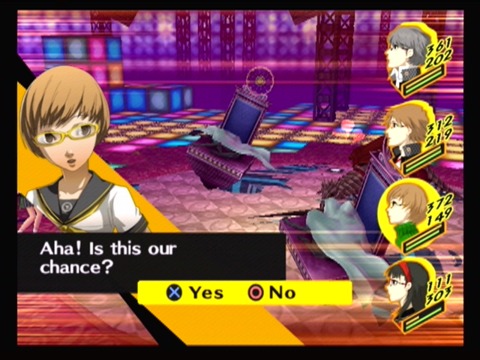
- 2008 - Shin Megami Tensei: Persona 4: It all started here for a lot of us, drawn to the site's mammoth playthrough of a little JRPG for an outmoded system that would nonetheless become one of the site's most enduring (so to speak) features. I'd already played Persona 3 by this point and was way the fuck on board for its sequel, but I dare say that watching their playthrough was almost more enjoyable than playing my own.
- 2009 - Demon's Souls: It was Giant Bomb and Vinny in particular that sold me on Demon's Souls, from a developer I had every reason to be wary of after playing Evergrace and Enchanted Arms (which I still sorta liked). I'm glad I followed their advice, because it was the first step in a peril-fraught journey through some of the greatest, most atmospheric, and most rewarding action-RPGs I've had the fortune of playing. A few years later, Giant Bomb graced us with Brad's own lizard-chasing playthrough of the game, letting me fall in love with it all over again.
- 2010 - Deadly Premonition: Where do you even start with Deadly Premonition? Probably with either of the Endurance Runs that the site produced, each conveying the confusion and horror of two different pairs of GB alumni as they struggle to make sense of Swery's deliciously weird "Silent Hill by way of Twin Peaks" adventure game. It's still the best bad game I own.
- 2011 - Bastion: A lot of big 2011 games didn't require much convincing, from Dark Souls (I was salivating for it after Demon's), Skyrim, Portal 2 and Yakuza 4. Other happy surprises, like Xenoblade Chronicles and Trails in the Sky, saw hardly any coverage at all. While I didn't love the game itself, I can't fault how comprehensive Giant Bomb's coverage of Bastion was, giving you all you could ever want to hear about the game prior to its release and letting us have insight into the Indie game development process in general.
- 2012 - Binary Domain: Despite being made by the Yakuza team, I might well have missed this sci-fi third-person shooter completely if it wasn't for the fuss Giant Bomb made about Big Bo and his talent for stating the obvious. I didn't expect to like Binary Domain, but then I didn't expect to like Vanquish either and I sure was proved wrong there. While not the greatest game, I found it infinitely more preferable than Gears of War and its other imitators, and I thank Giant Bomb for selling me on it by yelling expletives into its mic interface. (You better believe Sleeping Dogs and Spelunky (XBLA) are very close runners-up here, by the way.)
- 2013 - The Swapper: Hard to pick between The Swapper, Gunpoint and Gone Home, all of which were Indie games that got repped hard by the site. Vinny's love of the Swapper was perhaps the most personal and potent of that trio, though, and I've been steered towards many a great game with strong narratives due to his pressing.
- 2014 - Jazzpunk: I'm going to have to give this one to Jazzpunk, a game I never would've believed was as funny as it was without Alex Navarro, the site's legendary grump, convincing me otherwise. You might notice that with most of these years, I didn't need so much convincing for their AAA games - which were promoted everywhere - than I was the smaller games that resonated with certain staff members who then fought for them whenever it was required.
- 2015 - Super Mario Maker: I didn't realize I needed a Super Mario Bros. level editor in my life until Giant Bomb's significant coverage of the game, and the great content they wrought from same, got me on board the Maker train. While I had fun crafting my own Mario levels, the game's true value came from seeing what everyone else had done, not least of which the stages created with the help of the Giant Bomb community directly from the "Giant Bomb Makes Mario" suggestion streams and from those talented creators in our midst directly. Jeff and Dan proved particularly adept at it, as Patrick Klepek would discover to his ultimate chagrin.
- 2016 - Hitman: As someone who's never been a particularly big fan of stealth games, I'd given most of them a wide berth. Yet all the same, I was coerced to some degree into trying Metal Gear Solid to keep up with Dan and Drew's Metal Gear Scanlon feature, and sold on the prospect of the new Hitman episodic game by everyone on staff discovering it at their own pace. Even though I must've seen that tutorial boat assassination four or five times, the way Dan, Brad, Vinny and Jeff each approached it in their own discerning way was a wonder to behold. So too was the game they created to pull random victims, murder implements, and conditions out of a hat for a few unique challenges.
- 2017 - Prey: I'm still catching up with 2017's enormous back-catalogue, with a great deal of last year's best games left to delve into, and those that I have played like Nier Automata, Legend of Zelda: Breath of the Wild, Super Mario Odyssey and Persona 5 were always going to be games I was going to play regardless of the site's effusive praise for them. One game I might not have checked out otherwise was Prey, a sci-fi variant of Arkane Studios's balance of first-person stealth and combat in a well-developed world full of environmental storytelling seen in Dishonored. The site seemed way more positive about it than they had been with Dishonored, which was all the encouragement I needed. (What Remains of Edith Finch and Night in the Woods are two other games the site convinced me to check out, but I didn't include them here because I've yet to actually play them.)
- 2018 - N/A: A weird confession I have to make here is that I've yet to play a single game released in 2018. I can't really argue that any of the Giant Bomb staff members have sold me on a particular 2018 game if I've not gone out to buy it and play it based on their recommendation. Instead, here's some potential future purchases that are so far inspired more by Giant Bomb's coverage than by my own research and predilections: Subnautica, Into the Breach, Chuchel, Celeste, and Minit.
Since we've now moved back into the site's present, how about we take a look at some of this week's blogging:
- The Indie Game of the Week was another false start with Halcyon 6: Lightspeed Edition from Massive Damage. An Indie turn-based strategy space sim, Halcyon 6 felt like a streamlined version of something like Master of Orion, where building a fleet and exploring the galaxy is often secondary to keeping your homebase safe from harm and ensuring it's well-stocked with the resources it needs to keep going while your brave crew are off boldly going where no-one's been in a while. I grew tired of it fairly quickly once I realized how much grinding and uneventful courier runs would be required to get anywhere, but I commend the game for its look and the amount of depth it has in its systems, even if it doesn't really feel like explaining a lot of itself from the jump. Wasn't really my thing, ultimately; my endless quest to find a strategy sim as appealing as Master of Magic continues.
- I have in mind that spinning Autobot/Decepticon logo whenever I say this, but we once again have switched over to the Sega Mega Drive this week with Mega Archive: Part IV. This fortnight's batch of fifteen Sega Mega Drive games contains a few well-known names and slightly more obscure entries in the pre-Sonic era of the system, including the very well-received ports of Strider and Super Monaco GP, the slightly less beloved Rastan Saga II, Shadow Blasters, and Klax, another Japan-only shoot 'em up with XDR: X-Dazedly Ray, and the Miami Vice-themed and Jeff Gerstmann sorta-favorite Bimini Run. We're also seeing fewer games developed by Sega directly - just three this time - as more third-party developers flock to the fledgling system, including a great number of games from Sega's arcade rivals Taito and Namco. Part IV also introduces Activision (during perhaps the lowest ebb of its existence) and future Tales creators Wolf Team as first-time MD developers. It's another wiki rundown packed with Sega history, so be sure to check it out.
Addenda
Movie: Dark Star (1974)
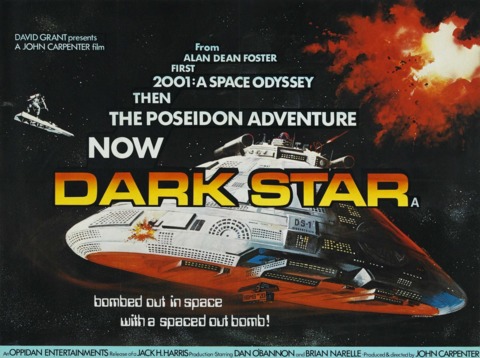
There's a certain subgenre of science fiction I'm into that I've taken to calling "space chillin'". In more elaborate terms, it's a type of science fiction (and occasionally non-fiction) that focuses to some extent on the drudgery and tedium of space travel, but in a way that is either mined for comedy or used to build suspense towards some cataclysmic system failure or an alien attack. A lot of 1970s sci-fi tends to feature this format after the success of 1968's 2001: A Space Odyssey - films like Silent Running, Star Trek: The Motion Picture, Alien, Solaris, and The Black Hole all had long stretches of downtime that aimed to represent the realities of space travel, with astronauts trying to hold onto their sanity while crossing vast distances of unremarkable nothingness. Consider also the quieter moments of shows like The Expanse, Cowboy Bebop, Ulysses31, and others, which only helped to enhance the "hang out" sensation of those shows between their busier action scenes and dramatic moments.
Dark Star fits this specific vibe so perfectly that I'm surprised I've never seen it before now. It's an oddly prescient movie too, mocking a number of sci-fi tropes that in some cases only became tropes after it was released. The film was originally the student project of Dan O'Bannon and John Carpenter that managed to procure enough money to become a professional movie, if only barely. It features four astronauts (technically five) who have all become slightly insane from the boredom of a multi-decade space mission in which they use artificially intelligent bombs to clear out wayward planets that may pose a threat to humanity's future colonization of those systems - e.g. planets heading irrevocably towards the system's star, causing long-term ramifications. When we meet them, they're all heavily bearded (besides one, who has made his obsessive personal grooming part of his psychosis) and clearly running on autopilot, barking various status updates and science terms in a monotony that suggests they've been doing it for quite a while.
I'd liken the movie to another quasi-student film with no budget, Kevin Smith's Clerks, in that nothing really happens in the movie until the very end, and most of the time you're just hanging out with these characters, listening to them make jokes and opine about their lot in life while occasionally getting into some hijinks. Likewise, the strength is in the ensemble cast of relative nobodies: Lieutenant Doolittle is the acting ship's captain after their commanding officer Commander Powell dies before the movie begins, and has completely checked out of the mission and ceased to care about anything besides dropping bombs and playing on an improvised organ created from bottles filled with various amounts of water to create different tones. Sergeant Pinback's the accident-prone and neurotic whiner that the others can't stand, and makes it apparent during a video diary confessional that the real Pinback killed himself before the mission started and he just got mistaken for him. Corporal Boiler endlessly trims his facial hair, smokes cigars (which is a feat on a spaceship), plays knife games and at one point brings out the ship's emergency laser rifle to play target practice to chase away his boredom. The final crewmember, Talby, has become so fascinated with the cosmos that he refuses to come down from the ship's observation dome, wanting nothing more than to see the mythical glowing "phoenix asteroids" passing by.
I'm fairly sure the movie is poking fun at 2001 in particular, twisting the awe and majesty of space travel into something hopelessly mundane and boring, but this sort of approach would go on to influence a great many other sci-fi productions that treat space travel as yet another job. Dan O'Bannon would go on to write the screenplay for the original Alien, taking a certain sequence from Dark Star where Pinback has to chase a crappy alien jerk shaped like a beach ball around the ship and turning that into a much more tense alien slasher movie. The crew of the Nostromo aren't too dissimilar from the Dark Star's crew: a group of working stiffs, bored out of their minds, trying to amuse themselves on their long voyage while their junker of a ship slowly falls apart from overuse. John Carpenter, meanwhile, would also become known for his various sci-fi outings like The Thing and Escape from New York as well as a whole host of other classic horror movies, though perhaps renowned most of all for the terse GOTY lists he's written for this site. It's a bit surreal then that these two masters of horror started off with a movie so benign and goofy that it literally ends with a man frozen in a block of ice hurtling into space while someone else enters a planet's atmosphere surfing on a piece of burning debris. I'm glad I finally got around to watching it, as another piece of classic 1970s sci-fi cinema to check off my list.
Game: Yakuza 5 (2012/2015)
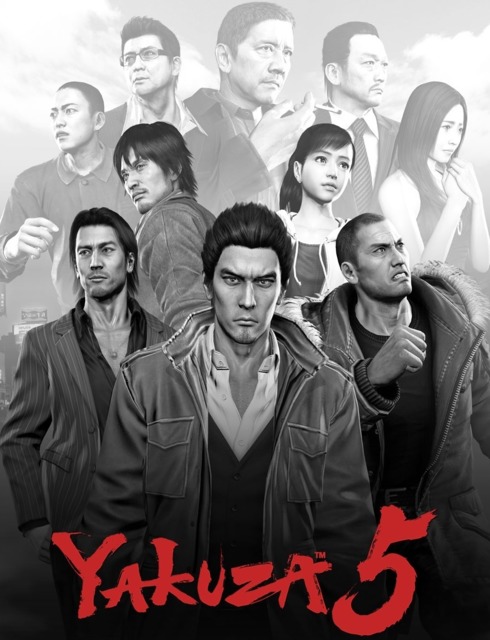
Yep, still playing Yakuza 5. It's the Game That Never Ends, after all. That isn't to say I'm bored of the game quite yet - the episodic nature of its different protagonists in different cities at least retains enough novelty from chapter to chapter to keep me on board - but it sure feels like I've been playing it a long time now. Last time we discussed Kiryu and Saejima's chapters, the cities they're living in, and their "side-stories": what feel like entire secondary games bolted onto the core Yakuza experience of beating people up, eating at restaurants to restore health, getting drunk, and maybe playing some pool or blackjack. This week, I'm going to talk about the other three protagonists: perennial kidnapping victim and wannabe idol-in-training Haruka Sawamura, suave moneylender and kicking expert Shun Akiyama, and the goofy and gallant former baseball star and current broke dirtbag Tatsuo Shinada.
Haruka's chapter represents the greatest shift we've seen in the series so far, as most of the usual content - fights, drinking, hostesses - have been excised due to the fact that Haruka is still a child. Instead, her chapter is all about her dream of becoming an idol - a catch-all profession for charismatic young women in Japan that can cover singing, dancing, acting, TV presenting, modelling, and apparently even stand-up comedy - and realizing that dream through a lot of practice and hard work. I won't go into her story stuff specifically - it's really endearing and cute, until it's suddenly and dramatically not - but most of her chapter is spent completing "jobs" and taking part in choreographed concerts. There's a strong rhythm game aspect here, and the game does you a solid by giving you a difficulty toggle that's irrespective to the game's overall difficulty - the idea being that you could be confident in your ability to hand some street thug his ass, but maybe not with elaborate rhythm game dance-offs. To the game's credit, it has two different formats for its rhythm game: the first is Haruka by herself, where she has to click the buttons as they slide in from various directions. It's not too dissimilar from the karaoke mini-game that's been with the series forever, though framed in a way that it doesn't block Haruka's dancing which is some smart design now I'm thinking about it. The other are the dance-offs, in which you "fight" an opponent by building up your heat gauge and activating special dance moves that either buff you or debuff them. The way they make this mode harder is by forcing you to switch "lanes" to where the button presses are, moving between four lanes with the D-pad while also hitting the correct face buttons at the right time. There's a much larger margin of error here: it's not important to get a perfect score, just outperform your opponent. Other Haruka-exclusive mini-games include a handshaking event, where you have to shake hands with fans for as long as you can before a bouncer shows up to shuffle them along, various TV interviews where you have to be careful with your responses, and one very dubious TV show that films idols running as fast as they can through various courses. The game was smart to stick Haruka's chapter right in the middle of the game, breaking up the usual pattern of fights and detective work that typify everyone else's chapters, and while I got a little bored of performing the same three songs I appreciated the big departure from the norm.
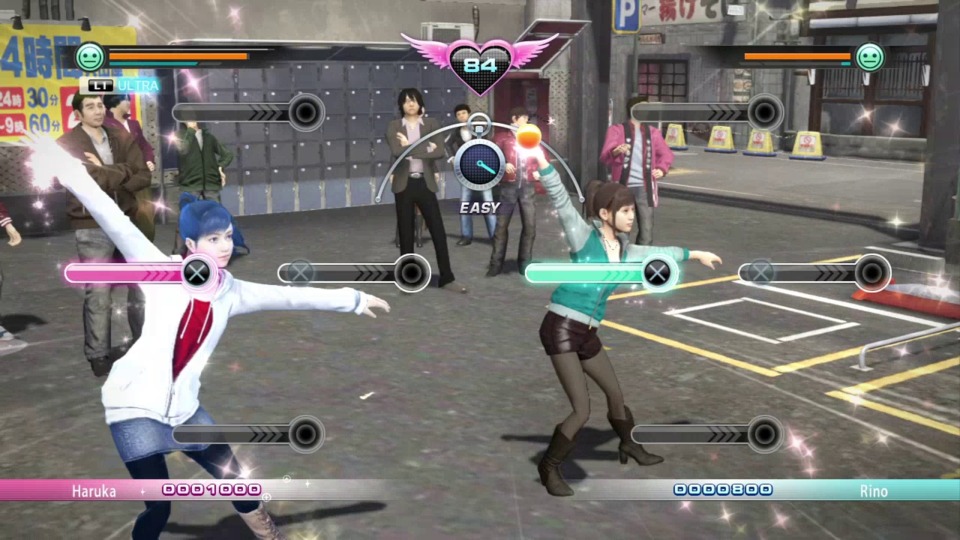
Akiyama's chapter, meanwhile, is far more mundane. He sort of shares chapter 3 with Haruka, being able to go into parts of the same city - the fictional Sotenbori district of Osaka - that she cannot, and occasionally working in tandem on various story goals. Akiyama's chapter is notable for being the shortest of the five: he only shows up halfway through Haruka's chapter, and doesn't have a "side-story" of his own. He still has a fair share of substories and training under military nut Saiga again, but the time you spend with him is so much shorter that it's very difficult to hit the max experience level with him, which I did easily with the other characters. It's a shame too, because he might be my favorite character to fight as: his kicking-based style is so much faster than the other characters, and can be effortlessly combo'd. Yakuza 5 also introduces "launch striking" to Akiyama's repertoire, allowing him to launch enemies into the air and combo them for as long as his heat meter lasts. Akiyama's fighting style is suited for beginners, hence why he's the starting protagonist for Yakuza 4, so it was really something to take the reverse path and go from Saejima's more tank-like fighting style (which is harder to work with, at least initially) to Akiyama's breezy beatdowns. Akiyama is just cool as hell too, as a guy so sharp that he always seems to know that the deal is, which makes it another bummer that his chapter is relatively short.
Then there's Shinada. In truth, I've not spent too much time with him yet or fully explored his stomping grounds of Kineicho (a fictional district of the real-life city of Nagoya) and I've yet to start his side-story, which I assume ties into his past as a former baseball prodigy. When we're introduced to Shinada, he's getting hounded by moneylenders he's in debt to, and in a hurry to conduct an interview with a middle-aged prostitute he's become attached to as part of his second career as a freelance journalist covering the adult industry. Despite his sort of weaselly situation, he's this ripped hunk of a guy and deceptively clever when it comes to certain matters, correctly identifying that a priceless antique baseball bat was actually a fake due to its composition, picking up on the fact that a hapless employee was being conned by his superior after a conveniently expensive breakage. One challenge that I've not had before in this series is the fact that Shinada is permanently broke: he even refuses to enter stores early on, remarking that he wouldn't be able to afford anything anyway. For the first few hours of his chapter, his money count has been in the three figures, which in yen equates to a child's pocket money. However, Shinada's fighting style is something I've not seen before: one that prioritizes weapon usage. Yakuza 5 has this odd new system where you can grow more proficient with weapons with use, reducing the amount they get worn down per hit and improving their damage as you level them up. I've not had to worry about weapons so far - everyone does well enough with their fists and feet - but Shinada's weapon skills are all high to begin with, due to his past as a professional sportsman no doubt, and he's given an iron pipe with infinite durability almost right off the bat (so to speak). Even without a weapon in his hands, he has this formidable "meteor tackle" that can be comboed into other attacks. I'm looking forward to using him more in this chapter and discovering more of his backstory, as the game's only truly new protagonist.
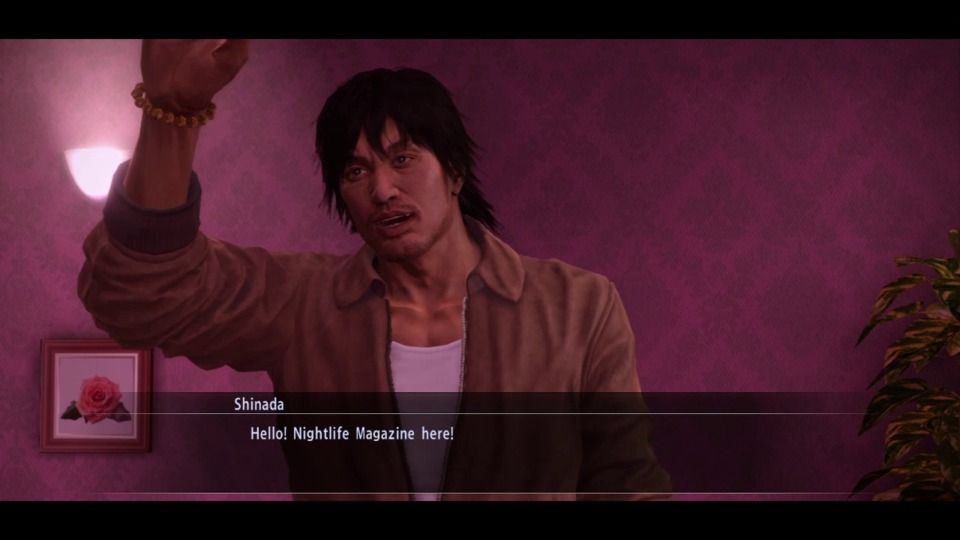
I'm hoping that next week is the last with Yakuza 5, though not wholly optimistic about that. Again, that isn't to say I dislike the game or have burned out on it quite yet - I'd have stopped if that were the case - but I'm always looking forward to the next new game I play. I haven't decided what it will be, besides something shorter, but I can consider my options as I finish up Shinada's chapter and move into the finale. Next week will also see the return of Indie Game of the Week and SNES Classic Mk. II, and I also hope to have the second half of E3 2018's Trailer Blazer list completed by then and outta my life. See you next time.
